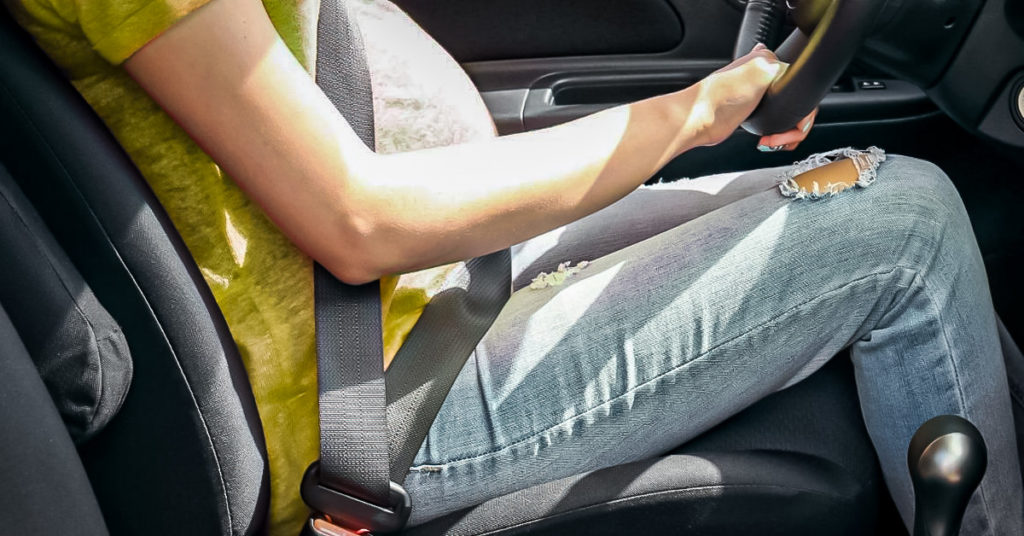Whether or not you should go off-roading when pregnant is a very contentious topic. It should be considered on a case-by-case basis as everyone has a different personal definition of off-roading.
To simplify a complicated question, you should not go off-roading between 3-8 weeks of pregnancy. You should also consult with your doctor before going and avoid extreme trails.
Why shouldn’t I go off-roading while pregnant?
Being off-road presents many unique risks particularly during volatile periods of your pregnancy. Going off-road presents many complications that you would not normally experience in your daily activities and this deters many expectant mothers and doctors from partaking in this awesome pastime.
The main risk is isolation. When you go off-road you often limit your access to medical facilities compared to more populated areas. Being as little as 20 minutes away from the nearest health care can dramatically impact the health of your baby should you need any medical assistance.
Another major risk is the increased chance of accidents. Four-wheel driving entails driving over some difficult terrains including ruts and forest trails. This increases your risk of getting into an accident. If your car rolls over or you crash you and your baby can both suffer grave health consequences.
This is exasperated by the fact you will be further from health care as mentioned above. If you are driving at the time of an accident, you are placing your baby in an even greater chance of harm. The steering wheel can easily push on your stomach which increases the risk of complications for your baby.
Some off-road terrains with steep inclines and declines and bumpier roads can also have an impact on your pregnancy. While some bumping and moving is completely expected in pregnancy, repeated extreme bumps and jolts can negatively impact the health of your baby.
Extreme bumping (particularly towards the end of your pregnancy) can cause minor brain injuries and abnormal heart rates within the baby. It can also increase your uterine activity which can result in you entering labor early which is particularly concerning if you are traveling on extremely rural roads.
There is also a matter of comfort and safety. As an expectant mother you will be needing the bathroom more frequently, and stretching breaks. Your bladder is already under a lot more stress and holding it may not be an option.
Also, you are at higher risk of deep vein thrombosis and will need to stretch out more frequently. On many off-road tracks, frequent stopping is not an option and you will be highly uncomfortable which will defeat the purpose of going off-roading, to begin with.
Why Can’t I go Off-Roading Between 3-8 Weeks?
This is the most sensitive time in your baby’s development as it’s the period where they begin developing their organs. This period is where your child is most susceptible to developmental issues and birth defects.
It is also one of the periods of pregnancy where you are already at risk of miscarriage and stillbirth meaning bumps and jolts could be fatal for your baby.
According to statistics, pregnant women are most likely to get in car accidents during this period as well. Compared to non-pregnant women and women in the other trimesters of pregnancy, you are at great risk of injury and injury to your child.
Risks of off-roading While Pregnant?
Accidents and rollovers can cause a variety of disastrous health impacts for both you and your baby. They can increase the risk of:
– Stillbirth.
– Birth defects.
– Placenta abruption (which can cause disruptions to the baby’s supply of oxygen and nutrients leading to possible birth defects and stillbirth).
If you get into an accident in the water and drown (even partially) your baby is at risk of even greater injuries due to lack of oxygen. Oxygen deprivation in the womb can lead to many adverse consequences for your baby including:
– Cerebral palsy.
– Brain damage.
– Low birth weight.
– Stillbirth.
While nine out of tenn times you will not have to worry about any of these issues you must be aware of the fact these are very real risks especially if you are determined to drive on more extreme unsealed roads.
Also bear in mind your proximity to medical services, the longer after an accident you do not get help the more serious the consequences will be for both you and your baby.
How to Decrease Risk When Off-Roading While pregnant?

There are a variety of strategies you can employ to limit the risk of these dire consequences when off-roading. These techniques are easy to deploy to increase your and your baby’s safety as you continue to enjoy the outdoors.
1. Stay in an area you know.
Sticking to trails you are familiar with or even those near where you live can dramatically decrease your risk of complications. Generally, you will know what to expect from these trails and be able to drive smoothly, plan stops, and avoid difficult passages. This will increase your comfort and peace of mind leading into the trip. Also sticking close to home gives you a clear place to go if you begin to feel uncomfortable.
2. Plan how you will get medical help.
Before you begin driving have a clear idea of where the closest hospital is and the path you will take to get there. Having a clear plan for emergencies will help you get to help much quicker. You should also try and find trails that are as close to medical help as possible in general.
3. Avoid tough trails and drive smoothly.
Most of the challenges for pregnant women are reliant on the tracks you choose. The more bumps the less healthy it is for mom and baby. You will want to pick smooth, easy trails and try to reduce the number of jostles in the cabin.
Picking easy trails should not be difficult and will ensure maximum comfort as you continue to enjoy your outdoor activities. Also try to drive with greater caution, try to avoid sudden acceleration and braking as these may throw you forward in the seat. It’s a good idea to take the tracks slower in general as well to increase the smoothness and safety of the trail.
4. Use your seatbelt!
This is one of the simplest, most effective strategies for minimizing your risk of injury in accidents. Wearing your seatbelt is one of the easiest things you can do to help you and your baby stay safe and secure in the vehicle even in rougher conditions. This may be more difficult if you are closer to full term as the seatbelt is more uncomfortable.
However, its essential for both you and your baby’s safety. If you find yourself struggling to wear a seatbelt for extended periods of time you can always buy seat belt extenders to improve your comfort without sacrificing safety.
5. Try and stay comfortable.
Choose days where you and the baby will be comfortable to travel i.e., not too hot or cold. This will ensure that you are not putting your body under any extra stress as you embark on the trail. Don’t be afraid to adjust the seat, crank up the AC, and wind down the windows.
You may also wish to bring along pillows to increase the comfort of your seat and to help you prevent back pain throughout the trip. The calmer and more comfortable you are the better the experience will be for both you and your baby.
What Terrains Should I Avoid if I am Pregnant?
We’ve mentioned avoiding rougher trails but as mentioned before everyone has a different definition of off-roading. Below are a handful of terrains and situations you will want to avoid as much as possible if you are driving off-road while pregnant.
– Avoid extreme inclines or declines. If the trail is mountainous there is a greater risk of accidents, and bumping within the track. All of these could harm you and your baby. Extreme inclines and declines also entail harsher conditions including deeper ruts and more rugged terrain.
– Avoid bumpy corrugated roads. When looking into trails try to find ones that will help you have a smoother ride. This will decrease the risks of accidents or injury to you and your baby.
– Thick, uneven sands. Sand is one of the most slippery road bases you will have to drive over. Try to choose trails with a solid road base as these decrease your risk of injury and jolting within the car.
– Rock steps. If you are avoiding harsh tracks this should be easy to achieve. Rock steps are obstacles that will cause the most bumping and bouncing. Climbing rock steps is also when you will be most likely to roll over and injure both yourself and the baby.
Can I Go Off-Road on My Road-Bike or ATV?
No. In these vehicles, you are putting you and your baby at even greater risk of harm. They have no doors or seatbelts to keep you secured to your seat to minimize injury in an accident. They also don’t have airbags or other appropriate safety features to minimize the risk of a roll-over on you and your baby.
ATVs and road bikes are also harder to drive smoothly over rough terrain which increases the amount of jolting you and the baby will experience. They are also smaller and less stable which increases your risk of crashes and injuries.
If you are going off-road, you should at least do so in a four-wheel drive for the health and safety of both you and your baby.
Conclusion
Off-Roading while pregnant is possible if you plan carefully and take extra precautions. You should not off-road alone while pregnant and not travel to remote areas.
If possible have someone else drive while you ride in the passenger seat. Try to avoid off-roading between weeks 3-8 of pregnancy.
- Tips and tricks For Setting Up Camp Like a Pro - September 11, 2023
- The Best Multi-Tools for Overlanding Adventures - August 25, 2023
- Off-Road Navigation Tips for Overlanders - August 13, 2023


